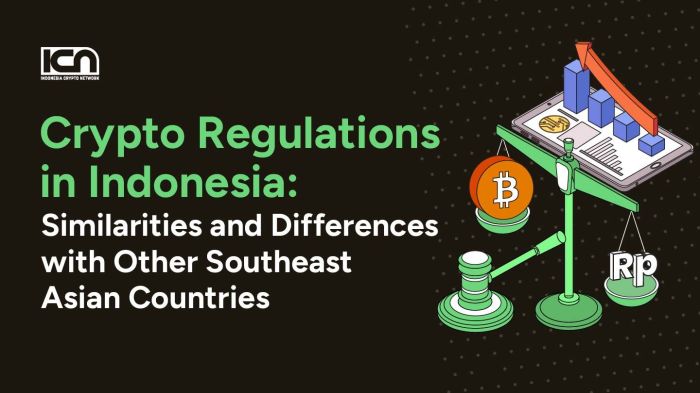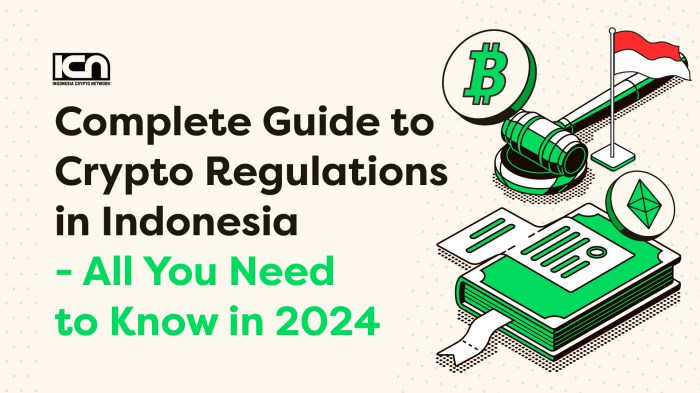Crypto Regulation in Indonesia What You Should Know sets the stage for understanding the complex world of cryptocurrency regulations in Indonesia, shedding light on the key aspects that individuals and businesses need to be aware of. From the history of regulations to compliance measures, this overview covers it all.
Overview of Crypto Regulation in Indonesia
Cryptocurrency regulation in Indonesia has evolved over the years, with the government initially taking a cautious approach to this new form of digital currency. In 2014, Bank Indonesia issued a warning that cryptocurrencies were not recognized as legal tender in the country. However, the stance began to shift in 2017 when the government officially recognized cryptocurrencies as commodities.
Current Legal Status
- Cryptocurrencies are considered commodities in Indonesia, meaning they can be traded and utilized, but not as legal tender.
- Individuals and businesses dealing with cryptocurrencies must comply with anti-money laundering and counter-terrorism financing regulations.
- Initial coin offerings (ICOs) are regulated by the Indonesian Financial Services Authority (OJK) to protect investors from fraudulent schemes.
Regulatory Bodies
- Bank Indonesia (BI): The central bank of Indonesia plays a crucial role in overseeing the use of cryptocurrencies in the country and ensuring they do not pose a threat to the stability of the financial system.
- Financial Services Authority (OJK): Regulates and supervises the capital market sector, including cryptocurrency exchanges and ICOs, to protect investors and maintain market integrity.
- Ministry of Communication and Information Technology: Responsible for monitoring and regulating the use of cryptocurrencies to prevent illegal activities such as money laundering and terrorism financing.
Regulations for Cryptocurrency Exchanges

Cryptocurrency exchanges in Indonesia are subject to specific licensing requirements to operate legally in the country. These regulations are in place to ensure transparency, security, and compliance with anti-money laundering and counter-terrorism financing measures.
Licensing Requirements
- Cryptocurrency exchanges in Indonesia must obtain a license from the Commodity Futures Trading Regulatory Agency (Bappebti) to operate legally.
- Exchanges are required to meet certain capital requirements, have a physical office in Indonesia, and implement robust security measures to protect user funds.
- Applicants must undergo a thorough due diligence process, including background checks on key personnel and shareholders.
Monitoring and Regulation
- Cryptocurrency exchanges are closely monitored by Bappebti to ensure compliance with regulations and to detect any potential risks or illegal activities.
- Regular audits and inspections are conducted to verify that exchanges are operating in accordance with the law.
- Authorities have the power to impose sanctions or revoke licenses if exchanges fail to comply with regulatory requirements.
Recent Updates
- In 2021, Indonesia introduced new regulations that require cryptocurrency exchanges to register with the Financial Services Authority (OJK) and adhere to strict reporting and compliance standards.
- The government has also expressed interest in exploring the potential of a digital Rupiah as a legal tender, which could impact how exchanges operate in the future.
- It is essential for exchanges to stay informed about any changes in regulations to ensure continued compliance and avoid any penalties or disruptions to their operations.
Compliance and Anti-Money Laundering (AML) Measures: Crypto Regulation In Indonesia What You Should Know

In Indonesia, crypto businesses are required to comply with Anti-Money Laundering (AML) regulations to prevent illicit financial activities and ensure transparency within the sector.
AML Regulations for Crypto Businesses
- Crypto businesses in Indonesia must conduct customer due diligence procedures to verify the identity of their users.
- They are required to report any suspicious transactions to the Financial Transaction Reports and Analysis Center (PPATK).
- Companies must maintain records of transactions and customer information for a certain period as mandated by the authorities.
Enforcement of AML Laws in the Crypto Sector
Compliance with AML laws in the crypto sector is enforced through regular audits and inspections by regulatory authorities.
- Regulators monitor the activities of crypto businesses to ensure they are following the prescribed AML guidelines.
- Non-compliance can result in penalties, fines, or even the revocation of operating licenses.
Examples of AML Measures by Indonesian Crypto Companies
- Implementing Know Your Customer (KYC) procedures to verify the identity of users before allowing them to engage in transactions.
- Utilizing blockchain analytics tools to track and monitor transactions for any suspicious activities.
- Training employees to recognize signs of money laundering and report them to the appropriate authorities.
Taxation of Cryptocurrencies

When it comes to dealing with cryptocurrencies in Indonesia, it’s important to understand the tax implications for both individuals and businesses. This includes how capital gains from crypto transactions are taxed and any specific tax policies related to mining or trading cryptocurrencies.
Capital Gains Tax
In Indonesia, capital gains from cryptocurrency transactions are subject to a final tax of 0.1% for individuals and 0.2% for businesses. This tax is applied to the gross amount of the transaction, meaning that the tax is calculated based on the total value of the sale.
Tax Policies for Mining and Trading
For mining activities, cryptocurrency miners are required to pay income tax on the profits generated from mining activities. The tax rate varies depending on the individual’s total income for the year. Additionally, traders who engage in cryptocurrency trading are also subject to income tax on their trading profits.
Value Added Tax (VAT)
In Indonesia, the trading of cryptocurrencies is considered a taxable service and is subject to Value Added Tax (VAT). The VAT rate is currently set at 10% for cryptocurrency transactions, which is similar to the tax rate applied to other goods and services in the country.
Reporting Requirements
It’s important for individuals and businesses involved in cryptocurrency transactions to keep detailed records of their activities. This includes records of transactions, profits, and losses, which will be needed for tax reporting purposes. Failure to comply with tax regulations can result in penalties or fines imposed by the authorities.
Future Outlook and Developments
The future of cryptocurrency regulations in Indonesia holds many possibilities as the government continues to navigate this evolving landscape. With a growing interest in digital assets and blockchain technology, it is crucial to anticipate potential changes and developments in the regulatory framework.
Potential Updates to Crypto Regulations
- The Indonesian government may introduce clearer guidelines for initial coin offerings (ICOs) to provide more certainty for investors and startups.
- Regulators could implement stricter measures to combat illicit activities and ensure compliance with international standards.
- There might be efforts to enhance consumer protection and investor education to promote a safer environment for cryptocurrency transactions.
Upcoming Initiatives in the Crypto Space, Crypto Regulation in Indonesia What You Should Know
- Indonesia could explore the possibility of creating a regulatory sandbox for innovative blockchain projects to test new technologies without the burden of full compliance.
- Collaboration with industry stakeholders and experts to develop a comprehensive framework that balances innovation and risk management in the crypto sector.
- Participation in regional discussions and partnerships to harmonize crypto regulations across Southeast Asia for a more cohesive approach.
Evolution of Regulatory Landscape
- As the adoption of cryptocurrencies grows, Indonesia may seek to attract more foreign investment by creating a favorable regulatory environment for digital asset businesses.
- Regulators might focus on enhancing transparency and accountability in the crypto market to build trust among investors and consumers.
- The government could introduce tax incentives or exemptions to stimulate the growth of blockchain startups and encourage innovation in the fintech sector.